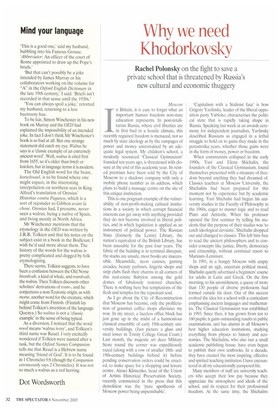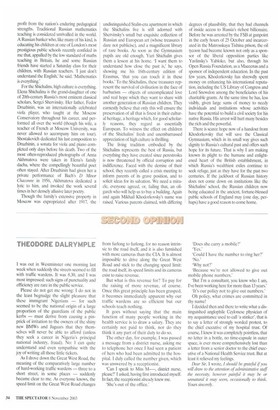Why we need Khodorkovsky
Rachel Polonsky on the fight to save a private school that is threatened by Russia's new cultural and economic thuggery Moscow In Britain, it is easy to forget what an important human freedom non-state education represents. In post-totalitarian Russia, where civil liberties are in first bud in a hostile climate, this recently regained freedom is menaced, not so much by state ideology as by the rampages of power and money unrestrained by an adequate legal system. My children's school, a modestly resourced 'Classical Gymnasium' founded ten years ago, is threatened with closure at the end of this academic year. Its rented premises have been sold by the City of Moscow to a shadowy company with only a mobile phone number as its address, which plans to build a massage centre on the site of this unique institution.
This is one poignant example of the vulnerability of non-profit-making cultural institutions in a society in which corrupt financial interests can get away with anything provided they do not become involved in liberal politics, and in which legislation is applied as an instrument of political power. The Russian State (formerly the Lenin) Library, the nation's equivalent of the British Library, has been unusable for the past four years. The fabric of the building is in terminal disrepair, the stacks are unsafe, most books are inaccessible. Meanwhile, neon casinos, gaming arcades, beauty parlours, lingerie shops and strip clubs flash their charms in all corners of this real-estate Babylon among the gold domes of fabulously restored churches. There is nothing here but temptations of the flesh and temples for the repentant soul.
As I go about the City of Reconstruction that Moscow has become, only the proliferation of gourmet coffee shops alleviates my woe. In my street, a faceless office block has just gone up in the midst of a harmonious classical ensemble of early 19th-century university buildings. (Just picture a glass and steel tower in Trinity College Great Court.) Last month, the majestic art deco Military Store round the corner was expeditiously razed (along with a row of smaller 18thand 19th-century buildings behind it) before pending conservation orders could be enacted, to make space for a shopping and leisure centre. Alexei Klimenko, head of the Union of Artists Historical Preservation Society, recently commented in the press that this demolition was the 'pure apotheosis of Moscow power being unpunishable'. 'Capitalism with a Stalinist face' is how Grigory Yavlinsky, leader of the liberal opposition party Yabloko, characterises the political state that is rapidly taking shape in Russia. Speaking last week at an awards ceremony for independent journalists, Yavlinsky described Russians as engaged in a lethal struggle to hold on to gains they made in the perestroika years, whether those gains were in the form of money, power or freedom.
When communism collapsed in the early 1990s, Yuri and Elena Shichalin, the founders of the Classical Gymnasium, found themselves presented with a measure of freedom beyond anything they had dreamed of. Classics teachers at Moscow University, the Shichalins had been prepared for this moment not by experience but by academic learning. Yuri Shichalin had begun his university studies in the Faculty of Philosophy in the 1960s, eager to master logic and to read Plato and Aristotle. When his professor opened the first seminar by telling his students that the purpose of their studies was 'to catch ideological deviants', Shichalin dropped out and changed to classics. This left him free to read the ancient philosophers and to consider concepts like justice, liberty, democracy and citizenship, without continual resort to Marxism—Leninism.
In 1991, in a hungry Moscow with empty shops and an ugly, uncertain political mood, Shichalin quietly advertised a beginners' course for adults in Latin and Greek. On the first morning, to his astonishment, a queue of more than 130 people of diverse professions had formed outside his door. Out of this success evolved the idea for a school with a curriculum emphasising ancient languages and mathematics. The Classical Gymnasium was established in 1993. Since then, it has grown from ten to 160 pupils; it gains outstanding results in public examinations, and has alumni in all Moscow's best higher education institutions, studying everything from physics to history and economics. The Shichalins, who also run a small academic publishing house, have even begun to publish their own textbooks. In a decade, they have created the most inspiring, effective and spirited teaching institution I have encountered in all my educationally pampered life.
Many members of staff are university teachers who accept their low pay because they appreciate the atmosphere and ideals of the school, and its respect for their professional freedom. At the same time, the Shichalins profit from the nation's enduring pedagogical strengths. Traditional Russian mathematics teaching is considered unrivalled in the world. A Russian banker who, like many of his kind, is educating his children at one of London's most prestigious public schools recently confided in me that, appalled by the low standard of maths teaching in Britain, he and some Russian friends have started a Saturday class for their children, with Russian teachers. 'I just don't understand the English,' he said. 'Mathematics is everything,' For the Shichalins, high culture is everything. Elena Shichalina is the grand-daughter of one of 20th-century Russia's most eminent classical scholars, Sergei Shervinsky. Her father, Fedor Druzhinin, was an internationally celebrated viola player, who taught at the Moscow Conservatory throughout his career, and performed all over the world (though his wife, a teacher of French at Moscow University, was never allowed to accompany him on tour). Shostakovich dedicated his last composition to Druzhinin, a sonata for viola and piano completed only days before his death. Two of the most often-reproduced photographs of Anna Akhmatova were taken in Elena's family dacha, where the compellingly beautiful poet often stayed. After Druzhinin had given her a private performance of Bach's D Minor Chaconne in 1956, Akhmatova dedicated a lyric to him, and invoked the work several times in her densely allusive later poetry.
Though the family's extensive property in Moscow was expropriated after 1917, the undistinguished Stalin-era apartment in which the Shichalins live is still adorned with Shervinsky's small but exquisite collection of Russian and European art (whose treasures I dare not publicise), and a magnificent library of rare books. As soon as the Gymnasium pupils are old enough, Yuri Shichalin gives them a lesson at his home. 'I want them to understand how close the past is,' he says, showing me his 16th-century edition of Erasmus, 'that you can touch it in these books.' To the Shichalins, these treasures represent the survival of civilisation in the face of barbarism — objects of uncomplicated love and real hope which they want to share with another generation of Russian children. They earnestly believe that only this will ensure the preservation of all that is finest in their cultural heritage, a heritage which, for good scholarly reasons, they regard as essentially European. To witness the effect on children of the Shichalins' fresh and unembarrassed appreciation of high culture is thrilling.
The living tradition embodied by the Shichalins represents the best of Russia, but everything they have created since perestroika is now threatened by official corruption and indifference. Faced with the demise of their school, they recently called a crisis meeting to inform parents of its grave position, and to solicit ideas for its salvation. We need a miracle, everyone agreed. or, failing that, an oligarch who will help us to buy a building. Again and again Mikhail Khodorkovsky's name was raised. Various parents claimed, with differing degrees of plausibility, that they had channels of inside access to Russia's richest billionaire. Before he was arrested by the FSB at gunpoint in the early hours of 25 October and incarcerated in the Matrosskaya Tishina prison, the oil tycoon had become known not only as a sponsor of the liberal opposition parties like Yavlinsky's Yabloko, but also, through his Open Russia Foundation, as a Maecenas and a sponsor of independent education. In the past few years, Khodorkovsky has shrewdly spent money on enhancing his international reputation, including the US Library of Congress and Lord Snowdon among the beneficiaries of his charitable grants. At the same time he has, less visibly, given large sums of money to needy individuals and institutions whose activities have the potential to build a civil society for his native Russia. His arrest will hurt many besides the rich and the powerful.
There is scarce hope now of a handout from Khodorkovsky that will save the Classical Gymnasium, which in its small way gives such dignity to Russia's cultural past and offers such hope for its future. That is why I am making known its plight to the humane and enlightened heart of the British establishment, in which Russia's wealthiest exiles continue to seek refuge, just as they have for the past two centuries. If the jackboot of Russian history does not come down on institutions like the Shichalins' school, the Russian children now being educated in the ancient, fortune-blessed public schools of England may (one day, perhaps) have a good reason to come home.



































































































 Previous page
Previous page